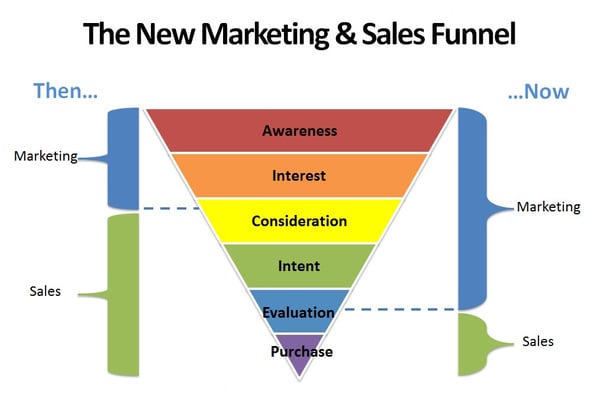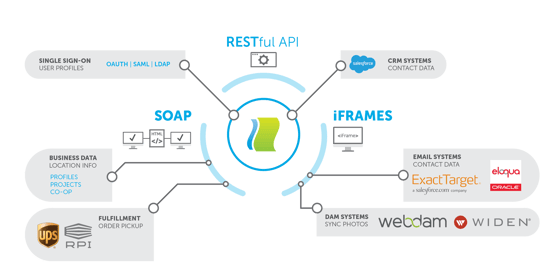
As a marketer of a multi-location business, it’s your job is to empower your local teams with great marketing and sales content. However, one of your organization's strengths (its size and scale) could quickly become a weak spot for your marketing efforts if you can't glean insight into how your field teams use your marketing content.
Below are a few of the advantages of moving towards a more data-driven approach to marketing by implementing a distributed marketing strategy within your organization, as well as the pitfalls of going without a solid strategy (which you may already be suffering from).
Without the proper distributed marketing plan, you’re dealing with a black hole of data which can lead to inefficiency in your marketing efforts, impact your ability to make quicker decisions regarding their effectiveness, and even hurt the morale of your corporate marketing team. Like any marketer, members of your marketing team want to see that their work is making a tangible impact on their organization as a whole, or fix whatever isn’t working. Without that insight on what is driving results (or what materials are even being used by your field teams), they may feel as though their work is going to waste.
You may be getting feedback from your local teams regarding the material you’ve been arming them with, but this can often be in the form of qualitative data, not the performance analytics that you need to make data-driven decisions. A few reps stating they “liked” the material just doesn’t cut it—you need actionable data.
Shifting to a Distributed Marketing Platform can alleviate many of your data-woes. The right platform can bring your marketing out of the dark ages and into the modern times by providing your marketing team with all of the actionable intelligence they’ve been hungry for—simultaneously boosting their morale and driving efficiency and more sales.
Knowing which materials led to outcomes such as website traffic and MQLs are no doubt important; however, marketing efforts need to be tied to actual sales outcomes. It is for this reason that marketing had often been viewed as a cost to an organization rather than a revenue generating department (such as sales) for years.
Times have changed, though.
Due in part to the impact of digital media, prospects are now able to get much of the information they need online, all without the need to speak to a sales rep. This shift in consumer behavior (in both B2B and B2C sectors) has given marketing a much more prominent role in nurturing prospects along the buyer’s journey. Now, marketing professionals in organizations big and small have finally been able to prove their worth in terms of dollars and cents. However, this is only possible only if they can track their efforts across multiple channels and locations.
 Image: Steve Patrizi
Image: Steve Patrizi
Shifting to a distributed marketing strategy will allow your teams to see outcomes such as usage and adoption for specific marketing pieces at each stage of the funnel and across your entire organization’s sales force. This visibility is crucial for assessing the overall ROI of your campaigns and the marketing department as a whole. Without these valuable insights, you’re unlikely to see what is and is not making an impact.
Having a more robust distributed marketing strategy (and the software to compliment it) helps to make your marketing team more nimble. With the proper data, you can now adapt and pivot your marketing efforts much more effectively to meet the overall business goals of your organization.
Without that valuable data on which marketing material is performing best (or underperforming) and which locations are best utilizing it, you might have a sense that something needs to change in broad terms, but you wouldn’t have the granular data to make an informed decision on what to pivot in order to meet your targets.
Having access to data is one thing, but having a well-integrated tech stack is key to making sure that information is reliable and easy to interpret.
With the average tech stack encompassing almost 20 different softwares and tools, it can be tough, but crucial, that you make them all work together. Having your marketing software built into silos will only make it harder for you to get the insight that you need, which defeats the whole purpose of having a Distributed Marketing Platform (and other automated marketing software). It’s important to think of the components of your tech stack as players on the same team, not individuals playing a completely different game.
Limited adaptability is often one of the biggest criticisms of “plug-and-play” software. That’s why it’s crucial that when you’re sourcing a Distributed Marketing Platform (or any software, for that matter) that it integrates seamlessly with your current tech stack.
Your local teams will thank you, as it makes it much easier for them to adopt to using your new software if it integrates well with the tools they are already using on a daily basis, leading to a less disruptive adoption period.
A study by MIT Sloan Management Review and Capgemini Consulting shows that there are several factors which impact the adoption rates of new software in an organization. Among those reasons are not choosing your software wisely.
“If your goal is a high adoption rate within the organization, make sure you’re choosing the most approachable, most intuitive system possible,” says Michael C. Mankins, of Bain & Company in an interview with Harvard Business Review.
To that point, the image below shows how a flexible software, such as Pageflex’s Distributed Marketing Platform can sit at the center of your software lineup. From your CRM systems, email automation, APIs and single sign-on with your current site. Everything works together to bring the organization forward, just like the players on a capable team.

The ability to make decisions based on data, not assumptions, is just one outcome of a robust distributed marketing strategy for a multi-location business. Download the Ultimate Guide to Distributed Marketing to get a complete picture of how distributed marketing can help you build your brand with more visibility and brand compliance.
© Pageflex Inc. | Powering Your Communications. Privacy Policy | Terms of Use